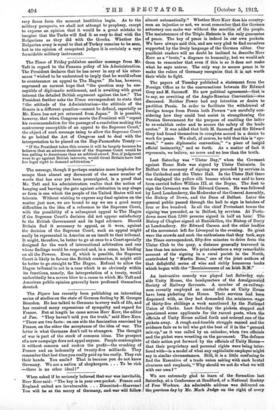The message, though it perhaps contains more loopholes for escape
than almost any document of the same number of words that has ever yet been promulgated, is a proof that Mr. Taft and his administration realize that the notion of banging and barring the gate against arbitration in any shape or form is one which the people of the United States will not tolerate. Without wishing to express any final opinion on the matter just now, we are bound to say we see a good many difficulties in the idea of a reference to the Supreme Court, with the possibility of a subsequent appeal to The Hague if the Supreme Court's decision did not appear satisfactory to the British Government and its legal advisers. Should Britain find it necessary to appeal, as it -were, against the decision of the Supreme Court, such an appeal might easily be represented in America as an insult to that tribunal. It might, therefore, be better to go at once to a Court specially designed for the work of international arbitration and one -whose findings would be respected and, in a sense, be binding on all the Powers. Even if, which is possible, the Supreme Court is likely to favour the British contention, it might still be better to go straight to The Hague. Refusal to allow the Hague tribunal to act in a case which is so obviously within its functions, namely, the interpretation of a treaty, would undoubtedly be a severe blow to a. cause to which Mr. Taft and American public opinion generally have professed themselves devoted.


































































 Previous page
Previous page